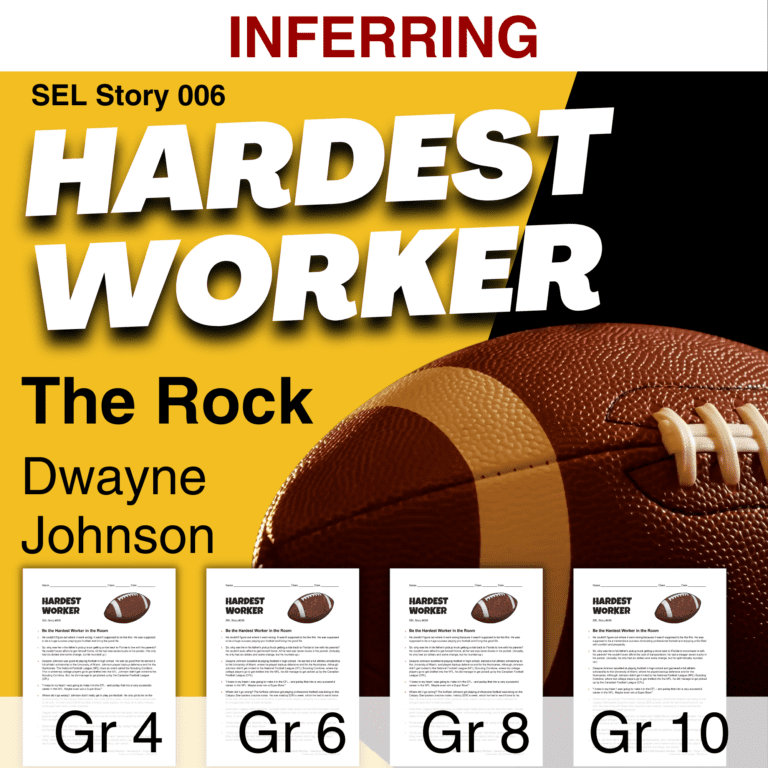This singer / songwriter wonders if she took it off for you, would people like her better?
What are we talking about?
Can your Middle School* and High School* students infer based on clues from the text?
* WARNING: Although this text is available at a Grade 4 reading level, please read the content warning and mental health alert at the bottom of this product description to decide if the subject matter is appropriate for your class.
Read the Non-Fiction Article:
What if I took it off for you?
At school, she had no friends. She would have play dates with girls separately and hang out at their houses as a child. But they weren’t friends at school.
Nemah Hasan just thought that’s how friends worked. Today, she seems like an extrovert with twenty million likes on TikTok. But Hasan is a true introvert. She is happiest when hanging out alone. She likes to do her own thing.
Hasan pays close attention to life. Her experiences would lead her to become a singer and songwriter one day. Hasan is proud to be one hundred percent Palestinian. She was raised in Canada on a small farm outside of Toronto. Growing up, her family was the only Muslim family in Milton.
Substitute teachers would have trouble saying her name at school. Nemah would explain, “it’s like Emma with an N in front of it – Nemah.” One day, she heard Nicki Minaj sing, “oh, my nemesis, exclamation, just for emphasis.” Hasan realized nemesis sounded like Nemah. That was in Grade 10. Since that moment, she started introducing herself, “it’s like nemesis – Nemah.” Hasan would turn that saying into her artist name, Nemahsis.
Hasan taught herself how to sing. As a kid, she used to hum a lot. She even sang without realizing it.
“It started as like a soothing thing because I was really introverted and making friends was really hard and I got really anxious around a lot of people. I’d always just said be humming and singing to kind of like cope, with the crowdedness of everyone around me.”
Someone pointed out that she sounded good. Hasan had trust issues. But there was no reason for that kid to lie to her. So, Hasan started to believe she sounded okay.
In Grade 11, a student teacher overheard her singing in the hallway. The student teacher said she should listen to Amy Winehouse. Amy Winehouse was a singer who sang deep, expressive, and soulful music. Hasan practiced an Amy Winehouse song for two days. Then, she performed with a live instrument in the school talent show. That was an important moment in her life. She talked about it during an interview with Colors:
“That was the first time I think the world got to hear my voice, the way it was supposed to be heard. That’s when I was like, ‘oh, okay, so I do sound okay, it’s not just a lie.'”
When Hasan was growing up, music was haram. Haram means forbidden by Islamic law. Her dad was religious and conservative. But her mom grew up with music. Music was a big part of her mom’s life. So music became a secret thing that the family hid from their dad.
Hasan and her mom, brothers, and sisters would listen to Arabic CDs. Hasan’s mom brought these CDs with her to Canada when she immigrated. In middle school, Hasan and her siblings started asking for CDs. They wanted songs from pop artists they heard on the radio.
If you like this content, you should definitely check out the reading comprehension strategies PDF bundle.
Hasan was in her early twenties before her dad discovered she could sing. A family member from Saudi Arabia sent her dad a video. It was an old video that Hasan had posted on social media years ago. In the video, Hasan was singing a Lana Del Rey song. When her dad played the cover of the Lana Del Rey song to her in the car, Hasan was horrified. Hasan felt ashamed. She retells the moment in an interview with CBC:
“I look over, and I was like, I’m so sorry. The first thing I said was I let you down. You and mom fought as immigrants trying to pave a way in this small town that’s predominantly White people to give us the chance and the opportunities you didn’t get, and I’m just out here throwing it all away.”
Her dad was crying. Here was an entire side of his daughter’s life that he had only discovered. He wanted to help his daughter. Her dad wanted to support her if she wanted this. It took Hasan a couple of years to think about it. Eventually, she accepted that she wanted to go after a music career.
In June 2021, she released her first song. The debut single was called “what if i took it off for you.” In March 2022, she released her first short album. It was an EP called “eleven achers.” Hasan then went on tour. She played concerts in Amsterdam, Paris, and London. In February 2023, she had more concert dates. These were in Toronto, Montreal, Brooklyn, and Los Angeles.
“eleven achers” only has six songs. That’s because it is an EP. An EP stands for Extended Play format and has fewer songs than a full album. The title “eleven achers” has two different meanings. “eleven achers” is about the eleven acres of farmland she grew up on. The title is also about lessons learned and the aches and pains of growing up. Hasan posts on TikTok. She posts original songs, viral covers, beauty tips, and forward fashion. She also posts little snippets into her life:
“Not only did I hide from my ‘religious’ father that I listened to music growing up but that I could secretly sing. He found out when I was in my 20s and was heartbroken that he just got to know the real me. Now I’m touring my original music and my family is going to be in the audience supporting me. People change and dreams do come true.”
Hasan loved singing. But Hasan didn’t think people like her could write songs. After all, when she grew up, she didn’t see people who looked like her in pop music or on TV. But then she started wondering if she could do something positive:
“I wanted to write a song for younger me that could potentially listen to and feel uplifted. You know, you have breakup songs, you have all these things that can help you get through where you could cry, eat chips, and sing to these songs stereotypically, but there was no anthem for what I was going through and no warning for what I would be going through in my late teens and I was like, ‘oh, this is a missed opportunity.'”
“what if i took it off for you” is the first song Hasan wrote. It is about feeling different and excluded. Hasan sings about wearing a hijab. Hasan grew up in a community where she was the only hijabi. She wonders if she removed her religious head covering, would people treat her differently? Would it open more doors? If she took off her hijab, would she get more opportunities?
The official music video went viral. It has over one million views. Hasan writes a message to listeners in the YouTube video description. She tells us there’s a deeper backstory about the song.
“… it tells the story of my experience shooting a global campaign for a multimillion dollar makeup corporation and being offered no recompense for it. Their justification was that ‘it’s more of an opportunity for the people of your community.'”
Hasan never tells us the name of the makeup corporation. She doesn’t talk about the company’s name in interviews or on social media. Readers can only guess what happened.
Influencer marketing is a type of advertising. Businesses connect with social media personalities to create content. Big corporations would make sure a contract was signed before starting any work. A contract can help avoid problems later on if people disagree. Once you sign a contract, you have to do what it says.
Legal documents can include many things. A legal contract can include a confidentiality section. (This means you can’t talk about what’s in the contract.) Contracts can also have a compensation model. (This means the contract says how people will get paid.) Contracts often include content usage terms. (This means how the company can use the photos. Normally an artist owns their content. But a contract can transfer the copyright and ownership of images to the company. This means the corporation owns the content as if you didn’t exist.)
Teachers, when you purchase this resource, you get this article in PDF, Google Doc, and Microsoft Word format differentiated at multiple reading levels. Otherwise, if you just copy / paste this content into a document, you’ll have to search for this paragraph so it doesn’t distract your students.
You might not know what to look for when you sign a contract. A lawyer can give you advice about possible issues. You might also not know you can hire a lawyer to help you. For example, imagine you signed a contract, but the contract didn’t say you would get paid. Then, later on, you are at a group photoshoot. You discover other people are getting paid. The company doesn’t have to pay you. You already signed a contract that doesn’t force the company to pay you.
You also had to allow the company to use your images. The legal document probably gives the company “worldwide, irrevocable” rights to use your photo. Irrevocable means you can’t revoke your permission. You can’t take back your consent to use the images.
A confidentiality clause could allow the company to sue you if you talk about your deal with the company. So we will likely never know the name of the makeup corporation that Hasan is singing about. But we do know how she feels about it. She tells us in her lyrics:
what if i took it off for you?
would you love me the way they never do?
i thought i should take it off for you
what a fool
i’m such a fool
Hasan did an interview with Complex. She explains how she told the brand, “I’m not going to be anybody’s token Hijabi girl.” Unfortunately, she couldn’t stop them.
“I felt like such an idiot. I was supposed to be strong and independent. I was too proud to admit what had happened. But I will not be anybody’s victim.”
“what if i took it off for you” combines strong feelings. Many people know what it’s like to be excluded. We know how it feels to be left out in social situations. We also know how frustrating it can be when you’re powerless to stop something. Sometimes, life is unfair. The song is like a personal anthem. It delivers a simple message. Many girls can relate to this song. Many people, in general, can relate to this message.
What if I… from an SEOT perspective
We can learn a lot about growing from mistakes from Hasan’s story. Optimizing is when you improve results. You can improve by using resources. You can also get better by using information. Finally, you can boost results by using a better process.
We can use numbers as a source of information. We can use data to help us make informed decisions. Hasan’s story shows us that optimizing can be more than looking at numbers. We don’t have to use numbers. We can also pay attention to everyday moments. Thinking about life can help guide our actions.
OPTIMIZATION Idea: Pay attention to life, consider options, and then take positive action.
Hasan’s origin story shows us a series of events. She started in a household where music was forbidden. She goes through several steps in her journey as a singer. The steps lead to her performing at concerts. Her family fully supports her in the audience.
Hasan’s humming started as a way to cope with crowds. Someone told her she had a nice voice. Hasan analyzed the information. She had to figure out if it could be true. Hasan decided the person had no reason to lie. So she started to think she did sound pleasant.
A teacher that Hasan didn’t know suggested she listen to Amy Winehouse. The person invited Hasan to perform one of Amy Winehouse’s songs. Hasan again analyzed the feedback. Based on this information and encouragement, Hasan sang in the school talent show. She felt more confident singing. The feedback from the crowd was positive.
The conversation with her dad was heartbreaking. His willingness to change must have been a powerful moment for Hasan. It was a sign that music could become a viable career for her.
Hasan didn’t think she could be a songwriter. She thought it wasn’t for people like her. The idea to write songs came from a powerful desire. Hasan wanted younger people (like her) to see their stories reflected in the media. Hasan decided to do something. She tried to help fix the lack of representation. She wanted to share her story with others.
Hasan channeled her negative experience with a makeup brand into songwriting. She found the process both healing and inspiring. Sharing a part of yourself can feel scary because you are so vulnerable. When people liked the first song, Hasan decided this process was working. She continued to tell other personal stories with more songs. Hasan knows she’s heading in the right direction with her music because her family is in the crowd. They are supporting her at one of her concerts.
Hasan’s story shows us a way to succeed. We can change what we do so that “dreams do come true” if we pay attention to life, think about events, and take action.
We can infer that if it worked for her to get through some tough times, it might work for us too!
Content Warning / Mental Health Alert
The title “what if i took it off for you” is suggestive.
- Younger students might only focus on the issue of taking off the hijab to gain acceptance.
- Older students will likely realize that this song appeals to both religious and non-religious girls, girls feeling pressured to wear more revealing clothing or to have sex or be intimate with a partner.
There is no mention of sex, romance, or intimacy in the article, although these are logical inferences that may come up based on lyrics quoted in the article.
- what if i took it off for you?
- would you love me the way they never do?
- i thought i should take it off for you.
- what a fool.
- i’m such a fool (article page 4, par 30-34)
You can read the full lyrics and watch the official video for Nemahsis – what if i took it off for you on YouTube:
Mental Health Alert:
NOTE: This information can also be found at the start of the Answers to the Discussion Questions PDF
This article and the ensuing discussion questions powerful because they explore real-world issues of doing things we may not really want to do to gain acceptance (i.e. what if i took it off for you.)
In particular, Questions #3 (Describe something you thought about doing to gain acceptance) and #6 (Create a self-script for younger you to get through the moment you described in question #3) have the potential to inspire great social-emotional learning moments, or unintentionally trigger mental health challenges.
The learning objective of this article is to develop reading strategies and inference skills to explore how themes of social exclusion and powerless frustration can lead towards positive change. i.e. if we feel social exclusion or powerless frustration, maybe if we can pay attention to life, consider options, and take positive action, we can get to a place where “dreams do come true.”
The reality is that as teachers, we can never fully be aware of who is in the audience or what hidden trauma or life obstacles our students are going through.
Every classroom reality is different. Please consider checking in with your parent/guardian community, and principal/administrator for feedback.
Teaching Ideas
Here are some guidelines to consider before leading classroom discussions or having students fill out the worksheet.
1. Share only what you’re comfortable sharing. Consider giving students the right to pass and not answer.
2. Make sure your response is appropriate and safe for a school environment:
- Only share things you’re okay with your teachers, classmates, parents, and principal finding out.
- Your teacher has a professional obligation to pass on information to other adults to help keep you and other students safe.
- A school worksheet is not an ideal place to ask for help with a tough situation. (Teachers have a lot of marking and may not see a plea for help.) Get help in person from a trusted adult
3. Know where to get help
- MENTAL HEALTH ALERT: Life is not fair. Life can be challenging.
- If you’re going through tough situations, please talk with a trusted adult to get help!
- Sometimes, everyone needs a helping hand, and that’s okay.
Preparing for student discussions / responding to questions #3 / #6
1. Consider brainstorming with your class examples of responses that teachers might have a professional obligation to take action on.
- If you wrote about committing a crime…
- If you wrote about someone getting physically hurt (you or someone else)…
- If you wrote about someone getting emotionally / mentally hurt (you or someone else)…
- If you wrote about property getting damaged…
2. Consider brainstorming with your class examples of too much information at school…
- Your friend may not want you to tell the teacher about that information…
- You may trust your teacher and some close friends to know about something personal about you, but what if a classmate accidentally reads your work (because it was left on a desk somewhere… or someone grabbed it from you?)
- You may not want your parents to know about this. What if your teacher or classmates mention it in passing to your parents? What if your parents want to see your marks? (I.e. In Grade 8, Hasan was probably okay if the teacher told her mom about her music, but would be horrified for her dad to know.)
3. Consider brainstorming some “school appropriate” examples
- Peer pressure to like a certain song or type of music
- Hiding the fact that you like playing Minecraft / Paw Patrol
- Laughing at jokes / pretending to be dumb / something you’re not so that your crush likes you
- Not trying out for something because it’s not cool. Only trying for something so you look cool / fit in. Not answering in class because you don’t want to look dumb.
4. Consider brainstorming a list of trusted adults.
- Who could we turn to get help or a second opinion about how to handle a tough situation?
- Some people will trust some adults but not others.
- Nobody is trusted by everybody all of the time.
- Friends are good, but they may not have the years of life experience or the breadth of knowledge that adults might have to help you get through tough times.
Possible adults:
- Parents/Guardians? Other Adult family members?
- Teachers? Guidance Counsellors? Principal? Other caring adults at school?
- Religious Leaders? Community group leaders? Police officers? Outreach Groups?
- Doctors? Counsellors? Therapists? Social Workers? Psychologists?
- Anonymous helplines? Distress and Crisis Lines? Kids Help Phone (Canada)?






